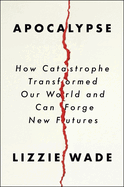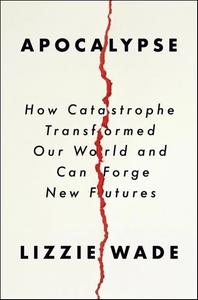
 Written amid one of the world's worst pandemics in a century and published in the wake of catastrophic California wildfires, journalist Lizzie Wade's Apocalypse widens the lens to describe vividly how multiple societies have experienced massive upheavals and have emerged altered in sometimes unexpected ways. Combining extensive research and reporting with some speculative digressions, Wade travels from prehistoric Europe to the contemporary West for stories of extreme hardship and humankind's response to it.
Written amid one of the world's worst pandemics in a century and published in the wake of catastrophic California wildfires, journalist Lizzie Wade's Apocalypse widens the lens to describe vividly how multiple societies have experienced massive upheavals and have emerged altered in sometimes unexpected ways. Combining extensive research and reporting with some speculative digressions, Wade travels from prehistoric Europe to the contemporary West for stories of extreme hardship and humankind's response to it.
Wade, a correspondent for Science, defines "apocalypse" as a "rapid, collective loss that fundamentally changes a society's way of life and sense of identity." It can be triggered by climate change, disease, and foreign invasion. In her view, "apocalypses are not endings. They are transformations," a perspective that makes them more fascinating objects of study than catastrophic, but localized, natural disasters.
With these criteria as her touchstones, representative of Wade's portraits is that of the Neanderthals, who occupied the earth for some 350,000 years before disappearing around 40,000 years ago. She describes recent discoveries that may remove some of the pejorative quality attached to their name and goes on to explain how radiocarbon dating has revealed their potential contact with Homo sapiens over a period of up to 5,400 years. After summarizing these investigations, she suggests that "we might give ourselves and our ancestors the gift of imagining a different kind of story about the apocalypse of their extinction," and then proceeds to do so in a creative but realistic sounding description of a possible encounter between tribes of Neanderthals and Homo sapiens.
Among the other epochal changes with radically different outcomes that Wade describes are those affecting a region known as Doggerland, once occupied by tribes of hunter-gatherers and now submerged below the North Sea; the demise from persistent drought of the thriving city of Harappa, once the center of the Indus River Valley civilization in what is today Pakistan's Punjab region; and the scourge of the Black Death that wiped out 30%-60% of the population of Europe and simultaneously laid the foundation for the Renaissance. She devotes considerable attention to the fall of the Aztec civilization in the 1520s and to the evidence of its existence that survives beneath the streets of modern Mexico City, where she lives. It's only one of the admiring descriptions she offers of the work of contemporary archeologists, who are among the heroes of her story.
One comes away from Apocalypse with mingled feelings of empathy for all the suffering--both self-inflicted and imposed from outside--that humanity has endured over the millennia and of admiration for the resilience we have shown in the face of it. Lizzie Wade has done an impressive job recounting some of these stories. ---Harvey Freedenberg, freelance reviewer
Shelf Talker: Science journalist Lizzie Wade takes readers on a tour of cataclysmic change and the transformations it engenders.

